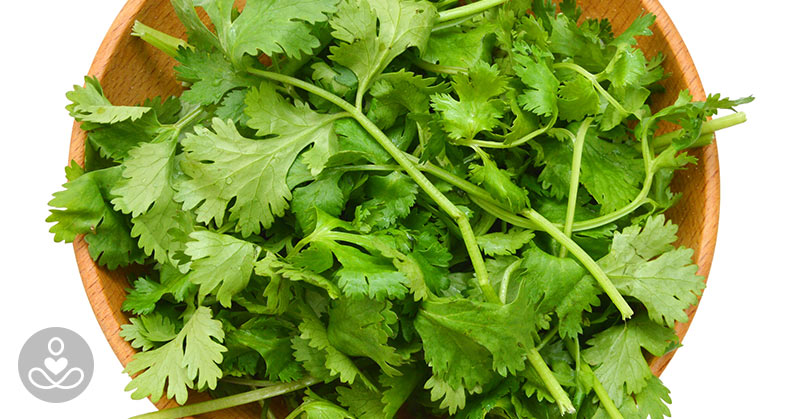Cilantro is a super versatile herb that adds a bright, citrus-like flavor to almost any dish. My first experience with cilantro was at a neighbor’s party when I was 16—I helped make a cold rice dish that had fresh cilantro in it (my job was separating the leaves from the stems).
I hated that dish. But I certainly don’t hate cilantro.
Some people really do hate cilantro, though, because to them it has a vile taste that’s been compared to everything from dish soap to cat pee (have you people ever even tasted dish soap or cat pee?). Some even describe it as a “dirt” taste.
Why does this happen? How can a beautiful, fragrant, flavorful herb taste so bad to some people? The answer may be revealed in a specific genetic component.
Where Does Cilantro Come From?
Cilantro is sometimes referred to as Chinese parsley, but it’s not parsley at all—it’s the leafy green part of the coriander plant, an herb that’s native to parts of Southern Europe, Northern Africa, and Southwestern Asia [1].
Many people confuse the appearance of cilantro with parsley (including my own husband at the store on occasion). However, the flavor profiles are different. Cilantro has a very refreshing, almost citrus flavor, and is perfect for Mexican dishes and even some Indian dishes.
Truth be told, I’m known for topping everything from Buddha bowls to Thai dishes and soups with this herb. Cilantro is the perfect way to cool off hot salsa or add a more complex flavor to guacamole.
While cilantro and coriander are from the same plant, the flavors of these two are different. Cilantro is typically served fresh (think as a garnish) to dishes, while coriander seeds are roasted and may be used whole or ground to season a meal. Where cilantro is cooling and fresh, coriander is warming and sweet.
You may recognize coriander in Indian cooking while cilantro is more common in Mexican and South American dishes [2].
Why Some People Hate the Taste of Cilantro
People who hate cilantro have been around for quite some time. In the 16th century, a man named John Gerard spoke of his hatred for cilantro, using the words “stinking” and “venomous” to describe the plant [3]. (Cilantro is not poisonous, for the record.)
However, new science is showing exactly why some people have such an aversion to the taste of this herb. People who dislike cilantro may have a gene called OR6A2, according to research done by Cornell University [4].
The soapy flavor that some people experience is the result of aldehydes in cilantro. Aldehydes are organic compounds that are present in nature and can have a pungent odor that leads some people—like those with the OR6A2 gene—to shy away from it [5].
People who have this gene may think cilantro tastes like soap or dirt, while others enjoy the taste or find it unoffensive. Interestingly enough, other research shows that up to 21 percent of people dislike cilantro and that most of these people are East Asian, with Caucasians following not far behind [6].
Can You Overcome the Soap Taste?
Did you know that it takes about 10 times of trying a specific food for you to tell if you actually like it or not [7]? Given this information, researchers think it’s possible for people who typically hate cilantro to come to love the herb.
You can help “release” the aldehydes in cilantro (which, remember, give it a bad taste for people with the OR6A2 gene) by crushing, mincing, or “bruising” the herb before eating it. In addition, you may want to cook with the herb instead of eating it raw to help reduce the flavor of the negative taste you experience.
So don’t give up on cilantro just yet—you may just find you like it after trying it after a few times!
What to Use If You Truly Hate Cilantro
If you really hate cilantro and not even a dozen dishes with this herb can make you like it, don’t stress. There are a few substitutes you can use instead.
One of these magical herbs is parsley, which is another staple in our household. Parsley has a different flavor, yes, but it has many health benefits and can add more flavor and a burst of freshness to practically any dish [8].
You may also choose to use dill in place of cilantro, which goes well in soups, seafood, salads, and dressings. Another great herb to try is tarragon, which is actually a member of the sunflower family and is traditionally used in French cooking. Tarragon has a range of health benefits as well. Some people suggest using all three of these herbs to create a similar flavor profile to cilantro!
Have Other Genes Been Linked to Taste?
Our genetics may play a larger role in our taste preferences than we think based on previous research.
We know that having one or two variants of the FGF21 gene makes people about 20 percent more likely to crave and enjoy sugar [10]. This means that if your parents enjoy sugar, you’re more likely to as well.
In fact, Italian researchers found 17 different genes that had associations with particular food preferences, including everything from bacon and coffee to blue cheese and orange juice [11].
It’s not surprising, then, that the dislike for cilantro has been linked to a specific genetic component, so if you don’t like cilantro, it’s likely your parents don’t either. Whether or not you enjoy this herb, it’s interesting to know it’s not just personal preference, but maybe more of a genetic one!
Sources
- https://www.localharvest.org/blog/48630/entry/a_little_history_of_coriander
- https://worldcrops.org/crops/cilantro
- https://www.jstor.org/stable/10.1525/gfc.2001.1.2.10?seq=1#page_scan_tab_contents
- https://arxiv.org/abs/1209.2096
- https://chem.libretexts.org/Bookshelves/Organic_Chemistry/Supplemental_Modules_(Organic_Chemistry)/Aldehydes_and_Ketones/Properties_of_Aldehydes_and_Ketones/Natural_Occurrence_of_Aldehydes_and_Ketones
- https://flavourjournal.biomedcentral.com/articles/10.1186/2044-7248-1-8
- https://eatfresh.org/healthy-lifestyle/feeding-children/new-foods-might-take-many-tries-your-child-likes-it
- https://www.organicfacts.net/health-benefits/herbs-and-spices/health-benefits-of-parsley.html
- https://www.scientificamerican.com/article/crave-sugar-maybe-its-in-your-genes/?redirect=1
- https://blogs.discovermagazine.com/d-brief/2014/06/05/our-tastes-for-certain-foods-may-be-written-in-our-genes/#.XO8VptNKj6Y

